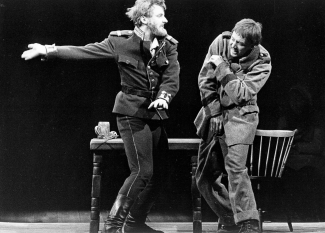Woyzeck
If Persona was Bergman's most experimental film, Woyzeck was his most experimental theatre production.

'The audience was drawn into the drama which stretched between two opposing poles: Büchner's text and contemporary - late 1960s - society.'Henrik Sjögren
About the production
After some 20 rehearsal sessions in a special studio at the theatre, the ensemble continued rehearsing on the arena stage on 20 February 1969, at which time theatre students, critics and other professionals in the field were invited to attend.
Critics were told they could write about the production at any time and talk to the cast but had to show respect for the work rules set down. Open rehearsals continued for a month. They took place twice a day, at 11am and 1pm.
Staging Woyzeck with open rehearsals might have been an attempt by Bergman to respond, in a professional rather than political way, to demands by young Swedish drama groups to make the theatre a more open and democratic institution.
The overall press response to Bergman's disciplined type of direction and his formal aestheticism was, to some, his version of Woyzeck resulted in a beautiful performance; to others it was too controlled and right. In Expressen, P O Enquist commented, 'Everything feels polished but conventional; spotless but spineless.
Sources
- The Ingmar Bergman Archives.
- Birgitta Steene, Ingmar Bergman: A Reference Guide, (Amsterdam University Press, 2005).
- Birgitta Steene, Ingmar Bergman: A Reference Guide, (Amsterdam University Press, 2005).
The critic of Sydsvenska Dagbladet headlined his review 'Bullying à la Bergman' and implied that the diminished acting space and lack of props were solely means for Bergman to control his actors.
Leif Zern in Dagens Nyheter, on the contrary, applauded Bergman's intentions.
I have never seen Bergman work more openly than here [... ] I experience his production as very liberating, very present [... ] It is personal but not at the expense of the material, and it is born out of a collaboration between text, direction, and actors that is unique in our country.
Collaborators
- Thommy Berggren, Woyzeck
- Gunnel Lindblom, Marie
- Charlotta Öhman, Christian
- Susanna Söderström, Christian
- Sigge Fürst, The captain
- Tord Stål, The doctor
- Lars Amble, Drum major
- Axel Düberg, Anders
- Ulf Johanson
- Agda Helin
- Sven-Eric Gamble
- Urban Sahlin
- Gösta Prüzelius, The jew
- Birger Malmsten, The fool
- Sif Ruud, The grandmother
- Margaretha Byström, Katrin
- Erik Hell, The inn keeper
- Ellika Mann, Margret
- Carl Billquist
- Malin Ek, The girl
- Cecilia Nilsson, First child
- Daphne Strååt, First child
- Madeleine Fjellström, Second child
- Mikaela Strååt, Second child
- Per Areskoog, Choir
- Bert Bellman, Choir
- Linnéa Broberg, Choir
- Hilde Ebbersten, Choir
- Mattias Erdelyi, Choir
- Einy Eriksson, Choir
- Ralf Glaerum, Choir
- Barbro Hedström, Choir
- Jan Åke Holm, Choir
- Pia Kornevall, Choir
- Annicka Kronberg, Choir
- Karin H. Larson, Choir
- Anders Levelius, Choir
- Franco Mariano, Choir
- Gertrud Mariano, Choir
- Mia Nyström, Choir
- Dick Olson, Choir
- Robert Panzenböck, Choir
- Axel Segerström, Choir
- Carl Skylling, Choir
- Inge Telander, Choir
- Harry Gloorup, Lighting
- Beata Bergström, Stills photographer
- Georg Büchner, Author
- Arne Hertler, Stage manager
- Mats Ek, Choreography
- Daniel Bell, Music
- Arne Lundh, Make-up and wigs
- Ingmar Bergman, Director
- Göran Sarring, Assistant director
- Holger Juhlin, Master carpenter
- Marik Vos, Designer
- Ann Toft, Prompter
- Per Erik Wahlund, Translation